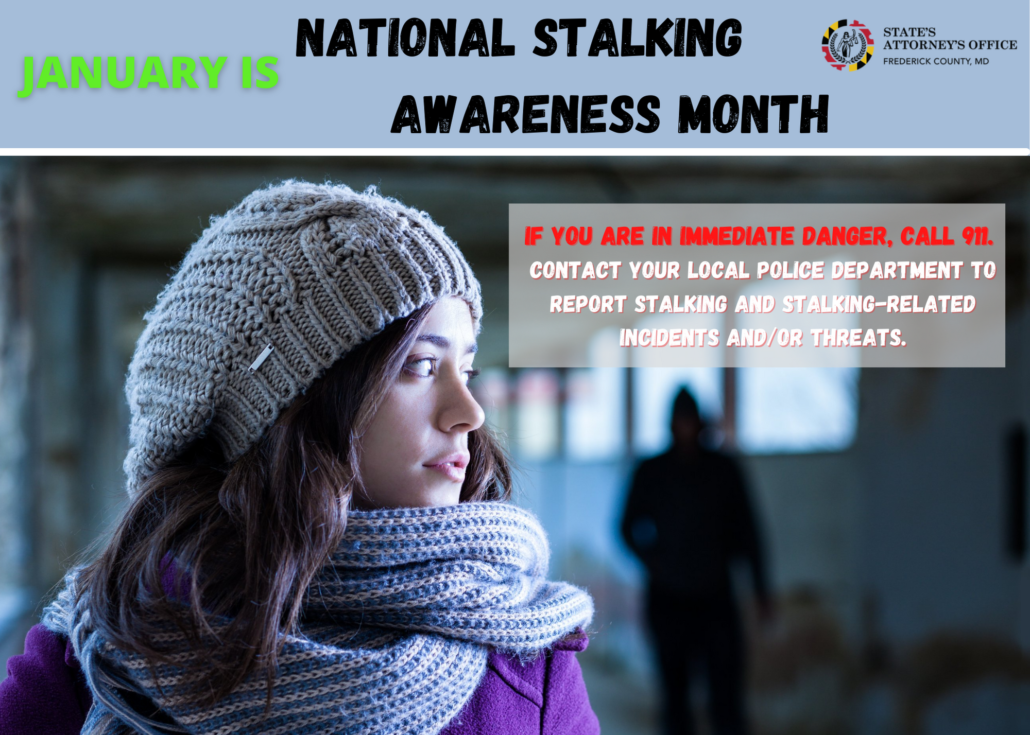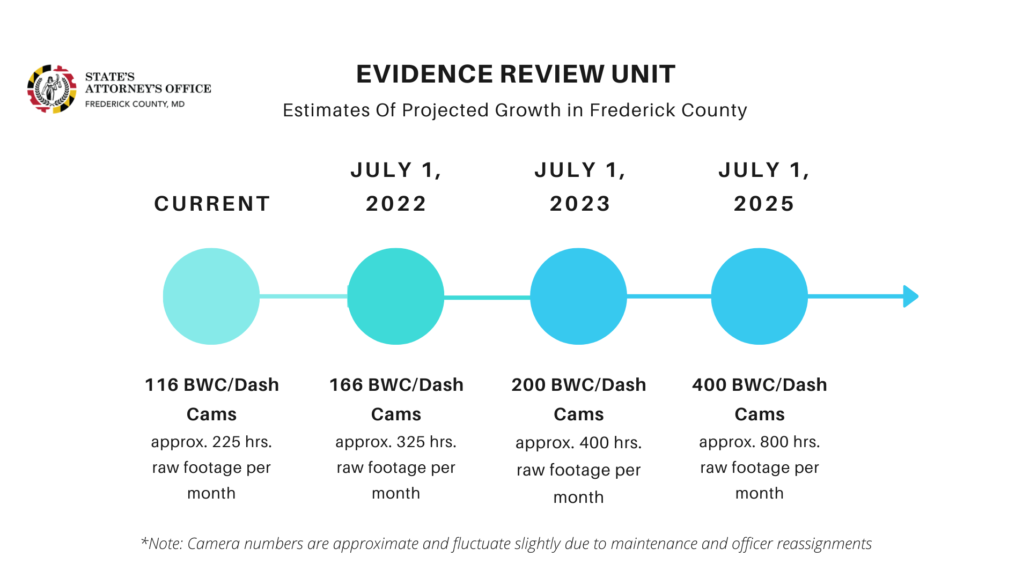January is National Stalking Awareness Month


FREDERICK, MD – Today in Frederick County Circuit Court, Daniel Alonzo Flythe, age 27, of Silver Spring, MD was sentenced to life suspend all but 40 years active incarceration in the September 2020 Waterside murder of Jaemari Anderson. The defendant appeared remotely for the hearing from the Frederick County Adult Detention Center due to a quarantine. Flythe asked for the court to recommend the Division of Correction’s Eligible Person Program, which Judge Adams denied. The parents of the victim were present in the courtroom and gave victim impact statements.
Flythe entered an Alford plea pursuant to a plea agreement before Judge Theresa Adams on December 13, 2021. An Alford plea is a type of guilty plea whereby a defendant does not admit to a crime, but acknowledges that the State has sufficient evidence to prove their guilt.
On September 6, 2020, Frederick County Sheriff’s deputies responded to a walking path behind the Waterside Community in Frederick for the report of a person suffering from head trauma. Passersby discovered the victim and called 911. The victim, Jaemari Anderson, was transported to Baltimore’s R. Adams Cowley Shock Trauma Center by Maryland State Police helicopter. A short time later, Anderson was pronounced dead. Investigators determined that the victim was killed by a single gunshot wound to the head.
After extensive investigation, detectives learned that Daniel Flythe and co-defendants Brian Henry and Jordan Hooks were gathered at the Hooks residence in Waterside on the night of September 6th. After a verbal dispute between Hooks and Anderson, Anderson, Hooks, Flythe, and Henry left the residence and walked down to the walking path. Believing he was about to get into a fight, Anderson turned to hand Flythe his eyeglasses, but instead was shot once in the head at close range by Flythe.
The State was represented by Assistant State’s Attorneys Jason Shoemaker and Tim Gilbert.

Daniel Alonzo Flythe
FREDERICK, MD – The State’s Attorney’s Office is proud to announce that the Frederick County Department of Social Services, Office of Child Support, in cooperation with the Child Support Division of the State’s Attorney’s Office have earned the Maryland State Child Support Administration’s Silver Award for outstanding performance in fiscal year 2021. The Silver Award is given to the counties who exceed their goals for the fiscal year in at least three of the four performance measures set for that county for the fiscal year (Support Orders Established, Paternity Established, Current Support Collections and Cases Paying on Arrears). Frederick County was one of only eight counties in the state to achieve this standard and were commended by Kevin Guistwite, Executive Director of the Child Support Administration when the awards were announced on December 10, 2021: “This level of success during the second year of the unprecedented COVID-19 Pandemic is an achievement for which all are to be proud.”
The State’s Attorney’s Office has been fortunate to have a working relationship under a Cooperative Reimbursement Agreement with the Department of Social Services Child Support Division for more than 20 years.
State’s Attorney Charlie Smith added, “our joint effort, hard work and cooperation has led to this great success, and we also acknowledge and thank Debbie Marini, Director, Tiffany Gregoire, Assistant Director and the entire Child Support Staff at DSS for this long term and successful partnership.”
FREDERICK, MD – Yesterday evening at approximately 5:30 pm, a Frederick jury returned guilty verdicts for 2nd degree rape, 3rd degree sex offense and 2nd degree assault in the trial of Willian Alexander Reyes-Reyes, age 28, of Frederick, MD. Judge Theresa M. Adams requested that the court’s assignment office determine a sentencing date.
On October 11, 2019, officers with the Frederick Police Department responded to an apartment on Waverly Drive in Frederick. Officers spoke with an adult female who advised her 14-year-old daughter said she was raped the day prior, October 10, 2019. Investigators learned that the victim had been hanging out with a group of friends in the woods behind the Elmwood Terrace Apartments on the evening of October 10th. The defendant, who was known to the victim, was also with the group. When the victim went to leave the group and go home, the Defendant insisted upon walking her home. Once away from the group, he told her he was lost and told her to sit down while he tried to figure out where they were. As soon as she sat down, he attacked her.
State’s Attorney Charlie Smith commented, “This young teenage girl was attacked and sexually assaulted by a grown man. The jury’s swift verdict in this case indicates they recognized the overwhelming evidence and witness testimony. We look forward to sentencing and making sure he never poses a threat to another child.”
The State was represented by Chief Assistant State’s Attorney Tammy Leache.

Willian Alexander Reyes-Reyes
FOR IMMEDIATE RELEASE
NOVEMBER 3, 2021
FREDERICK, MD – This morning in Frederick County Circuit Court, Nicholas David Anderson, age 34, of Thurmont, MD, was sentenced to 25 years in the Division of Correction, suspending all but 10 years active time, after pleading guilty to 1st Degree Assault and Possession of a Shotgun by a Disqualified Person. Upon release he will be on 5 years of supervised probation.
On July 30, 2020, Frederick County Sheriff’s deputies were dispatched to a home in the 8700 block of Yellow Springs Road for the report of a fight in progress. Deputies determined that the defendant and another man had been fighting on the front porch of the home. Inside the home, the Defendant’s wife was suffering from head trauma. Investigators learned that the victim was struck twice in the head with the butt of a shotgun after an argument with Anderson, resulting in a hairline skull fracture. Anderson was prohibited from possessing firearms as the result of a prior felony conviction.
The Victim addressed the Court and offered words of advice for those currently experiencing domestic violence. She said: “You deserve someone that’s going to protect you, emotionally and physically protect you. Someone you can trust. Not someone you need protection from.”
The State’s Attorney’s Office encourages anyone suffering from domestic violence to reach out to law enforcement for help. You are not alone. Victims can also reach Heartly House, 24/7 at 301-662-8800 for confidential support.
The State was represented by Domestic Violence Unit Chief Assistant State’s Attorney Brett Engler.

Nicholas David Anderson
FREDERICK, MD – This afternoon in Frederick County Circuit Court, a jury found Oleh John Kuziw, age 36, of New Market, MD guilty of 2nd degree assault. The Honorable Judge Julie Stevenson Solt scheduled sentencing for Tuesday, November 30, 2021 at 9:00 am.
On April 4, 2021 at 4:08 pm, Frederick County Sheriff’s deputies were dispatched to the 6800 block of East Shavano Road in New Market for the report of a domestic incident in progress. While en route, dispatchers advised a responding deputy that the adult female victim was now at a McDonald’s Restaurant parking lot located in the 2400 block of Osprey Way South in Frederick. Deputies and responding EMS units observed visible swelling to the victim’s face and eyes. The victim was transported via ambulance to Frederick Health Hospital where she received treatment in the emergency room and was assessed by the Forensic Nursing Unit. Investigation revealed the injuries sustained by the victim were consistent with strangulation. Deputies determined that the defendant and victim were engaged at the time of this incident.
The State’s Attorney’s Office encourages anyone suffering from domestic violence to reach out to law enforcement for help. You are not alone. Victims can also reach Heartly House, 24/7 at 301-662-8800 for confidential support.
The State was represented by Assistant State’s Attorney Lindsey Carpenter.

Oleh John Kuziw
FREDERICK, MD- This afternoon in Frederick County Circuit Court, Elvin Maxwell Addison Jr., age 41, of Frederick, MD entered a guilty plea and was sentenced before the Honorable Judge Julie Stevenson Solt. The State, defense, and Judge Solt reached a binding agreed sentence of 60 years suspending all but 25 years in the Division of Corrections. Addison plead guilty to Attempted Second Degree Murder, Armed Robbery, and Second Degree Assault on a Law Enforcement Officer. The defendant must also serve 5 years of supervised probation upon release.
On May 26, 2020 at approximately 2:16pm, Frederick Police officers were dispatched to 37 Winchester Street for the report of an armed robbery. When patrol officers arrived, they found the victim suffering from severe injuries in a carport at the location. The victim was transported by emergency medical services to Meritus Medical Center and later transferred to R. Adams Cowley Shock Trauma Center in Baltimore for treatment.
Investigators determined that the victim was the landlord of the apartment building located at 37 Winchester Street and the defendant was one of his tenants. The victim was on the property doing lawn maintenance when he was approached by the defendant carrying a handgun. The defendant fired the gun in the direction of the victim, missing the victim, and then struck the victim multiple times in the face, taking his wallet including approximately $500 in cash. The defendant then fled on foot away from the area. Detectives learned through witnesses that Addison was a suspect and placed a lookout for his vehicle. The defendant was later tracked down in the area of West Frederick in his vehicle and a traffic stop was conducted. As officers attempted to take Addison into custody, he began to resist and bit an officer in the arm. Pursuant to arrest, officers recovered $501 from Addison. Despite search efforts, the firearm from the incident was not recovered.
State’s Attorney Charlie Smith commented, “the victim in this case suffered through a long recovery process and is dealing with numbness in the face that may never go away. Meanwhile, the police officer that was attacked still has a scar from the bite wound. My hope is that these victims feel relief in knowing that this defendant will be in prison for a very long time.”
The State was represented by Chief Assistant State’s Attorney Rebecca Clinton.

Elvin Maxwell Addison Jr.
FREDERICK, MD- This morning in Frederick County Circuit Court, Eric Eugene Mooney, age 46, of Westminster, MD appeared before the Honorable Judge Julie Stevenson Solt for sentencing. Judge Solt sentenced Mooney to 25 years in the Division of Corrections, suspending all but 10 years active incarceration for a 2019 home invasion. The State had requested 15 years active incarceration while the defense argued for less than 10. Mooney entered an Alford plea to the charge August 24, 2021. An Alford plea is a type of guilty plea where a defendant does not admit to the criminal act but acknowledges that the evidence presented by the prosecution would be likely to persuade a judge or jury to find the defendant guilty beyond a reasonable doubt. Prior to sentencing, Mooney paid restitution to the victim. In addition to his prison sentence, Mooney will be required to complete 5 years of supervised probation upon release.
On October 9, 2019, Frederick County Sheriff’s deputies were dispatched to a home in the 5300 block of Legion Drive in Mt. Airy for the report of a home invasion. The female victim inside the home advised that at approximately 8:10 am, a white Ford F-350 pickup truck pulled into her driveway. The defendant exited from the truck and approached the home, appearing to be dressed as a utility worker and wearing an “elderly man” costume mask. The defendant asked the victim “I want to see if you have power out down there”, seemingly covering his mouth to disguise his voice. The victim responded with “what?”. The victim then opened her storm door, at which point the defendant rushed at the victim, grabbing her by the neck and pushing her back inside the house. He then tied up the victim with zip ties, forced her to give him the combination to open a safe in the home, and made off with approximately $13,000 in currency plus additional valuables. Mooney was identified in June 2020 as the suspect, after sunglasses he wore in the commission of the crime that had been left at the scene tested positive for his DNA in FBI CODIS (Combined DNA Index System).
Following the ruling, State’s Attorney Charlie Smith commented, “This was an outrageous and horrifying attack on the victim. It was forceful and pre-planned. No one should feel unsafe inside their own home. This sentence was not only warranted but needed to protect the community from this defendant.”
The State was represented by Chief Assistant State’s Attorney Rebecca Clinton.
####

Eric Eugene Mooney
FOR IMMEDIATE RELEASE
September 24, 2021
FREDERICK, MD – Late Thursday afternoon in Frederick County Circuit Court, a jury found Clifford Edward Barnett, age 54, of Hagerstown, MD guilty of 2nd Degree Rape, 3rd degree sex offense, and 4th degree sex offense. The State requested that Barnett’s $25,000 unsecured bond be revoked after this conviction. Judge William R. Nicklas Jr. ruled that the defendant could remain on bond until sentencing. A sentencing date will be scheduled by the court’s assignment office.
At approximately 7:53 am September 30, 2019, officers with the Frederick Police Department were dispatched to a home in the 600 block of Taney Avenue in Frederick for the report of a rape. The female victim was transported by Frederick County DFRS EMTs to Frederick Health Hospital for a forensic medical examination. Detectives learned through investigation that the victim and the defendant had visited several downtown Frederick bars together, along with another male friend of the victim, the night of September 29th. The three consumed several alcoholic beverages over the course of the evening. The defendant then drove the victim and the other male friend to her house. The three continued to socialize until approximately 3am, when the victim made beds for the two men to sleep in and then went to bed in her bedroom on another floor of the residence. In the early morning hours of September 30th, the victim was awakened to find the defendant in her bed sexually assaulting her. She immediately jumped up and began screaming and the defendant ran out of the residence.
The State was represented by Chief Assistant State’s Attorney Tammy Leache.

Clifford Edward Barnett
FREDERICK, MD- The Frederick County State’s Attorney’s Office is marking the one-year anniversary since the inception of the Evidence Review Unit (ERU). The ERU, which is comprised of four investigators and a supervisory Assistant State’s Attorney, is responsible for identifying, requesting, and reviewing all digital audio/video evidence generated by police during the course of a criminal investigation. Police body-worn cameras (BWCs), vehicle dash cameras, cellular phone videos and data, recorded witness interviews, and other audio-visual recordings are all examples of digital evidence the ERU reviews and processes.
The ERU was formed in tandem with the Frederick City Police Department’s (FPD) 2020 expansion of their BWC program. Today, FPD has approximately 98 BWCs deployed and is expecting that number to grow very soon to closer to 150. Additionally, the Maryland State Police in Frederick currently operate approximately 18 vehicles equipped with dash cameras. Combined, these devices produce on average 225 hours of raw footage per month that must be obtained and reviewed by our office. The review process for any given case takes on average about two times the total length of the raw footage to be completed. This means that each ERU investigator has the capacity to process and review about 4 hours of raw footage per day.
Earlier this year, the Maryland General Assembly passed a series of bills focused on the criminal justice system including the requirement that virtually all Maryland law enforcement be equipped with BWCs by certain dates.

Pursuant to this newly enacted legislation, the Maryland State Police is required to equip, at a minimum, all of its patrol troopers with cameras by July 1, 2023. For the Frederick Barrack, that will amount to approximately 35 cameras added in the next two years.
Local departments, including the Frederick County Sheriff’s Office, Thurmont Police Department, and Brunswick Police Department, have until July 1, 2025 to fully implement their BWC programs. Based on a review of current roster assignments, it is anticipated that the Frederick County Sheriff’s Office will equip between 150-175 deputies while Thurmont Police will equip approximately 10 and Brunswick Police will equip approximately 15. Pilot programs are expected to be implemented by these departments well in advance of the deadline date.
The future demands of body-worn camera review, rapid increases in deployment, and additional needs for digital evidence review will necessitate additional staffing within the ERU. By 2023, we project that at least one additional investigator will be needed as a result of the July 1, 2023 deadline for MSP to fully implement their BWC program. By 2025, we expect the unit will need to grow even further as approximately 400 police officers within the County are expected to be equipped by this time.